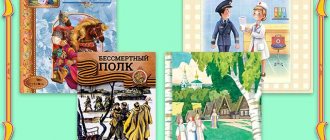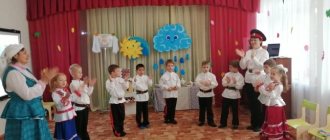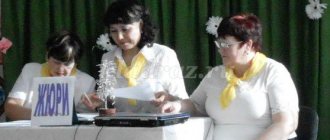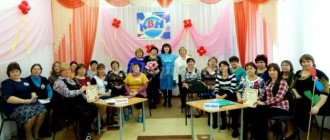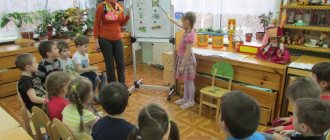MAGAZINE Preschooler.RF
Pedagogical Council "Patriotic Education of Preschool Children"Methodological developments
Dovgal Irina Valerievna Senior teacher GBOU School No. 1207 Moscow 2015
Target:
- systematize the knowledge of teachers about the organization of educational activities with preschool children on patriotic education;
- increasing the professional level of teachers in working with children on patriotic education.
- the formation of moral and patriotic feelings of preschoolers in the process of studying the history, culture, and natural features of their native country.
Preliminary work:
- Conducting operational control . ”
- Conducting a consultation “Patriotic education of preschool children”
- Conducting a workshop-seminar “Moral and patriotic education of preschool children”
- Design of the thematic exhibition “Patriotic Education” (work experience, literature, methodological developments).
Progress of the teachers' council:
1. Patriotic education of a child is the basis for the formation of a future citizen. Patriotic feeling does not arise on its own. This is the result of long-term, targeted educational influence on a person, starting from a very early age.
Much has been written about the importance of introducing a child to the culture of his people, since turning to the paternal heritage fosters pride and respect for the land on which you live. Therefore, children need to study and know the culture and history of their country. Consequently, patriotic education of children is one of the main tasks of a preschool institution.
Kindergarten is a place where a child gains experience of broad emotional and practical interaction with adults and peers in the most significant areas of life for his development.
The system of patriotic education covers all levels of educational activity and is implemented through certain stages, forms and methods.
Stages of patriotic education:
- preliminary, basic - the formation of the moral foundations of the individual, the accumulation of experience in moral behavior and relationships with other people, the development of moral feelings;
- artistic and educational – acquaintance with folk traditions, national art;
- cognitive-emotional – development of interest in one’s country;
- emotional-effective – the formation of the desire and ability to realize relationships and knowledge in practical and imaginary activities.
Means of patriotic education:
- surrounding mesoenvironment;
- fiction and art;
- folklore;
- Practical activities.
Methods of patriotic education (correspond to the stages of work with children and their age):
- increased cognitive activity;
- emotionality of perception;
- adjusting the children’s image of the Motherland;
- coordination of different types of activities.
Forms of patriotic education:
- creation of a development environment;
- thematic classes;
- interaction with parents;
- interaction with society (excursions around the city, region, excursions to museums, exhibition halls, etc.).
Objectives of patriotic education:
- nurturing in a child love and affection for his family, home, kindergarten, street, city;
- formation of a caring attitude towards nature and all living things;
- instilling respect for work;
- developing interest in Russian traditions and crafts;
- formation of basic knowledge about human rights;
- expanding ideas about Russian cities;
- acquaintance with the symbols of the state - coat of arms, anthem, flag;
- developing a sense of responsibility and pride for the country’s achievements;
- the formation of tolerance, a sense of respect for other peoples and their traditions.
These tasks are solved in all types of children's activities, as they instill in the child not only patriotic feelings, but also form his relationships with adults and peers.
So, the construction of the pedagogical process at each stage is built taking into account the age characteristics and capabilities of children, when selecting appropriate methods and the dominant goals of education.
2. Fostering love for the Motherland in children (speech by educators).
It is always necessary to talk about the importance of patriotic education. Currently, the idea of cultivating patriotism and citizenship is becoming increasingly important and is becoming an important state task.
A preschool institution is the initial link, designed to form in children a first understanding of the world around them, their attitude towards their native nature, their small Motherland, their Fatherland.
During the period of preschool childhood, the formation of cultural and value orientations, the spiritual and moral basis of the child’s personality, the development of emotions, thinking, feelings, and awareness of oneself in the world around them occurs.
Patriotic education of preschool children has its own characteristics:
- A child’s feeling of love for the Motherland begins with love for close people - father, mother, with a feeling of their warmth, care, attention. These childhood emotions later become the basis for the emergence of more complex social feelings.
- Nurturing patriotism means nurturing love and affection for the place where the child was born, for the small Motherland. It has been historically proven: a person who knows his native history, the culture of his native city, shows love, devotion, and respect for his homeland.
| Next > |
Pedagogical council on the topic: “Spiritual and moral education of preschool children”
“Kindness must become the same
normal human condition
like thinking. She must
become a habit."
V.G. Sukhomlinsky
You have probably heard the phrase “out of the kindness of your heart” more than once. And more and more often one hears irony in it rather than generosity. The greatest danger of modern society, where material values prevail over spiritual ones, is the destruction of personality. We all want one thing, to protect our children from cruelty, indifference, and aggression. How to explain to a child that such qualities of the soul as mercy, generosity, kindness, compassion, love for one’s neighbor, which are characteristic only of humans, make us happier and kinder.
Education of morality begins with the formation of the concepts of good and bad, with awareness of one’s actions, both good and bad. How to explain to a child that every good deed is a particle of goodness invested in the world of kindness? It makes you feel warmer, brighter and more joyful, and every bad deed is a grain of evil, which makes you feel dark and scary. How can you help your child feel the need to contribute to the good and realize the responsibility for contributing to the bad?
The concept of good and bad for a child is an abstraction, because they cannot be touched or seen. How to bring these concepts to life? How to make it work? One of the main reasons for a child’s indifferent attitude towards others is a lack of understanding of other people’s emotions and experiences. As a rule, adults try to protect the baby from worries and negative emotions, fearing that they will negatively affect his mental health. As a result, the child does not learn to understand the people around him, sympathize with them, and empathize with them. The teacher’s task is to see what is hidden in the souls of children, and help them cope with their emotions and experiences, and teach them to feel the people around them.
Children see reality in their own way; they judge their own actions and the actions of others, based on their still limited life experience. Therefore, the teacher needs to skillfully and unobtrusively teach the child to correctly perceive and evaluate life situations. Working with children, we never cease to develop self-care skills; for this we read them poems and fairy tales, such as “Masha the Confused Man”, “The Incompetent”, and discuss current situations. Good relationships with people and peers help to develop role-playing games, where the children themselves play the leading role. For example, the game “Home”, “Come to us for tea”, “Doll Katya is sick”, etc. During the game, humane feelings are brought up, caring for the doll as a bearer of human qualities, they teach children to be polite.
We created a card index “Polite Fairy Tales”, in which the heroes are our familiar animals who help each other. At a young age, children perceive polite words as something formal and optional. Therefore, it is important to develop the habit of constantly saying “hello”, “thank you”, “goodbye”. The best helpers in this situation are the heroes of your favorite books, as well as examples of adults.
During activities and games, we often include elements of motivation, i.e. the presence of a third party. It could be Carlson, who accidentally dropped into our kindergarten to play with the children, a bear cub, a bunny who ran away from the wolf, or we create and together solve problem situations such as “The dog is lost,” “Why is the bunny crying,” “Kolobok” who needs to be saved from the fox,” etc. We draw a cheerful face on the ball and pass it around, not forgetting to praise our little bun and say warm, kind words to him.
In the daily life of the group, we often use good poems, quatrains, such as “it’s you, and it’s me, you’re good to me, my gift is dear, and I don’t need another!” When putting the child to bed, we recite nursery rhymes and jokes; we use them when waking up children, during water procedures, before sitting down at the table, in any situation. Folk wisdom has always taught us only good things.
From the first years of their lives, children are familiar with the works of A. Barto “Bull”, “Bunny”, “Bear”, “Our Tanya”, the heroes of which cannot help but sympathize and want to help. These simple poems teach humanity, a caring attitude, and when you watch how a girl rocks a doll, holding it close to her, or how little fingers painstakingly help glue a book that has been read to holes, you understand that kindness will save the world!
It is not easy to penetrate into the inner world of a child, understand him and come to mutual understanding. It’s not easy for parents, and even harder for teachers. To solve this difficult problem, the adult tries to stretch a thin spiritual thread that would connect him with the child. The main thing is to try to maintain this connection and not let it break!
Bibliography:
Preschool education No. 09.2007

